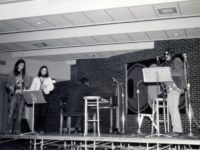Back when I was a young man in my twenties, I had frequent cravings for testosterone-driven jams—just like any young man does. But while some of my buds got their fix through the likes of Van Halen, AC/DC or Metallica, I often turned to McCoy Tyner.
McCoy Tyner? Absolutely, why not. He’s brash, in-your-face, and percussive, just like Angus Young. McCoy just doesn’t need stacks of Marshall amps, that’s all.
To be sure, the famed piano player from John Coltrane’s sixties quartet plays with a lot of complexity and subtlety. But his right hand is scary fast and he can stuff as many notes in a chords that his old boss used to. In fact, the one criticism often leveled at him is that he plays too many notes. The way I look at it, there’s a time when Bill Evans is right and then there’s time for Tyner. Besides, no one ever minded Art Tatum’s lack of economy.
So back around the time Triumph was the favored man-music I picked up Trident, McCoy’s Tyner 1975 release that was his first all-trio album in over a decade. No brass, no solo piano; just a power group consisting of former Trane cohort Elvin Jones on drums and Ron Carter on bass.
With this crew, McCoy assembled a trio of such instrumental prowess as to be the Rush of jazz, and this album largely brings forth the promise. For some odd reason, however, Tyner doubled on celeste and harpsichord on some of the tracks, bringing a strangely baroque flavor to the songs. But then once he switches over to piano, you soon forget about that unnecessary diversion.
The song where Tyner goes balls to the wall more than any of the others is Jobim’s “Once I Loved.” We already discussed the great Brazilian composer Antonio Carlos Jobim just the day before, and Jobim’s songs are among Tyner’s favorites to cover. But Tyner’s idea of bossa nova jazz emphasize the “jazz” part a lot more; jazz of the more frenetic, hard bop variety.
McCoy inserts an intro to the song which he performs on the celeste, over Jones’ hastened 8/4 signature and Carter’s high end circular bass line. As Tyner swings over from the celeste to the piano at the 35 second mark, Carter signals his impending arrival with one of his trademark rides down and back up the neck, and before you know it Tyner is off to the races.
There’s really nothing complicated at all to this arrangement of the song; Tyner just plays the chorus over and over again. So to sustain a listener’s interest for nearly eight minutes he has to keep coming up with new ideas on each go around of the chorus. And that’s where the leader’s prowess really shines. Even though it’s bossa, it’s one bossa you want to crank up on your stereo as Tyner lays to waste the notion that piano players are wimpy.
While there’s no solo space for niether the bassist nor drummer, both of these guys are offering maximal support. Jones’ rimshots get accentuated with his thunderous fills while Carter keeps the song anchored in it’s gorgeous melody, while McCoy is cascading notes like Niagra Falls. The outro goes just as the intro did, with Tyner briefly back on celeste. Here, it serves as a soft landing after a wild flight.
These days, I take more time to enjoy the softer music like Evans than I used to. But inside every old man is a young man sometimes wanting to get out. In my case, he still likes him some McCoy Tyner.
“One Track Mind” is a more-or-less weekly drool over a single song selected on a whim and a short thesis on why you should be drooling over it, too.
- Christian Marien Quartett – ‘How Long Is Now’ (2024) - April 18, 2024
- Dave Douglas, feat. James Brandon Lewis – ‘Gifts’ (2024) - April 11, 2024
- Thollem – ‘Worlds In A Life, Two’ (2024) - April 8, 2024



